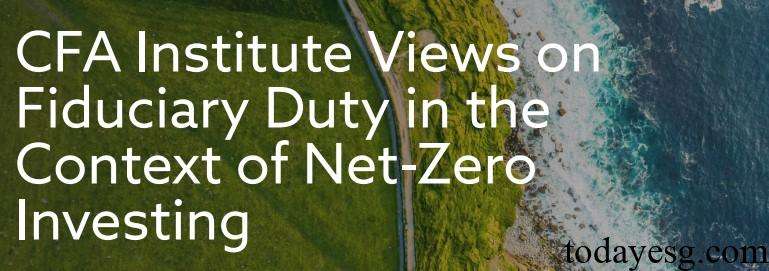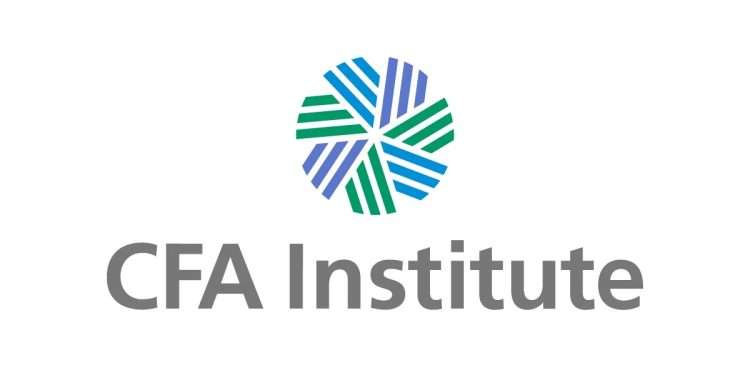Net Zero Investment and Fiduciary Duty
The CFA Institute Research & Policy Center releases a report on net zero investment and fiduciary duty, aimed at analyzing whether net zero investment meets fiduciary duty.
The CFA Institute previously developed a net zero investment approach, and there is currently no consensus globally on whether the net zero factor should be included as part of the fiduciary duty in the investment process.
Related Post: Institutional Investors Group on Climate Change Releases Net Zero Investment Framework 2.0

CFA Institute’s View on Fiduciary Duty
The CFA Institute believes that fiduciary responsibility is a fundamental obligation of investment professionals, which includes two key concepts:
- Loyalty: Acting according to specific investment abilities, putt the interests of beneficiaries first, and avoid conflicts of interest.
- Prudence and care: Invest cautiously based on reasonable judgment and diversify according to existing theories.
The CFA Institute defines net zero emissions and net zero investment in the net zero investment method, taking into account the perspectives of industry practitioners, policy makers, asset owners, and other stakeholders. Net zero emissions is a potential state where emissions minus removals are zero. Compared to net zero emissions, net zero investment is more specific and involves the following important goals:
- Realize risk and return.
- Reduce the financial risks of climate change on asset owners’ investments.
- Profit from the long-term macroeconomic opportunities brought about by climate change.
- Efforts have been made to achieve the net zero emission target.
Investors who implement net zero investment have different concerns about the above goals. Some investors only focus on the risks and returns of investment, while others are concerned about the impact of net zero emissions on the environment and society.
Relationship Between Net Zero Investment and Fiduciary Duty
In its previous statement on net zero investment policy, CFA Institute stated that its goal is to:
- By researching, organizing, and promoting the knowledge, skills, tools, practices, and capabilities needed to address climate change and transition to a low-carbon economy, build professional investment capabilities in this field.
- Utilize the appeal of CFA Institute and the connections among its members to promote participation, sharing, and cooperation on complex issues.
- Advocate policies that are beneficial to the goals of CFA Institute and investors.
Based on the above analysis, CFA Institute has summarized the relationship between net zero investment and fiduciary duty:
- The fiduciary should balance risk and return, and achieve maximum financial benefits within a certain range of risks. The fiduciary must consider many material risks, including climate change risks and the different time frames in which the risks apply.
- When balancing risk and return, the fiduciary should consider all factors that have a material financial impact on investment decisions. Therefore, considering climate risk is the fiduciary’s obligation to analyze material risks when making any investment decisions, especially in the context of physical and transitional risks. The fiduciary has an obligation to conduct prudent climate risk management, regardless of whether they make net zero investments.
- The fiduciary also needs to understand that investment decisions are made within a broad economic and financial system, and therefore need to consider a range of systemic risks, weigh these factors, and make investment decisions within the applicable time frame.
- In fulfilling their duties, the fiduciary may assess whether net zero investments can help mitigate long-term risks associated with climate change and enhance the long-term value of investments by considering these issues.
- In a wide range of economic and financial systems, fiduciaries who consider climate issues aim to increase returns and reduce risks. At the same time, there may also be new and uncontrollable risks or opportunities that arise.
- In some cases, if obtaining short-term returns poses identifiable risks to the long-term sustainability of investment returns, fiduciaries may consider rejecting investment strategies that offer short-term returns. The fiduciary needs to discuss these factors with the beneficiaries.
- After making investment decisions, the fiduciary should consider whether engagement can improve investment returns or reduce investment risks. These activities can assess the implicit risks in investments and understand future cash flows. The fiduciary may also influence the actions of regulatory agencies and policy makers in order to improve the system that supports future investment returns.
Reference:
CFA Institute Views on Fiduciary Duty in the Context of Net-Zero Investing
Contact:todayesg@gmail.com








